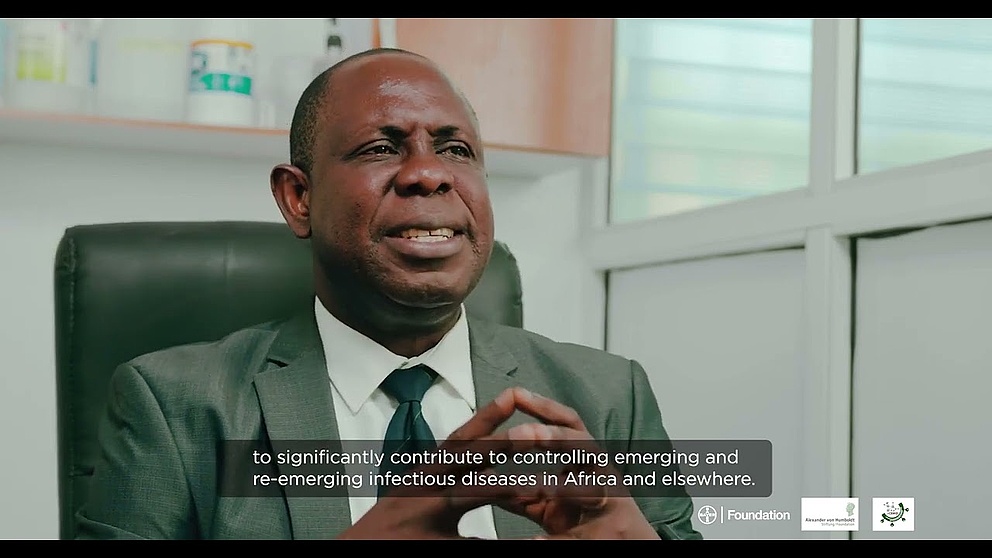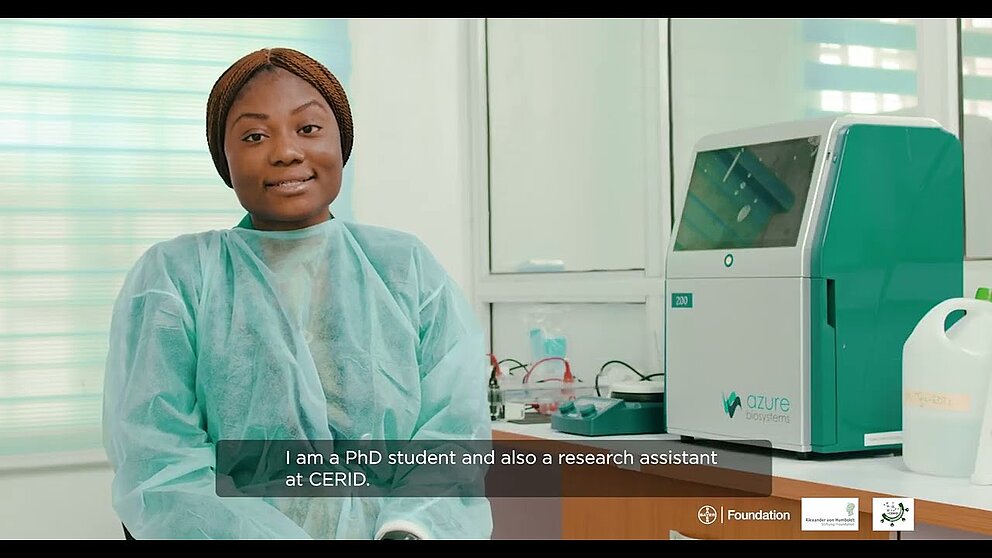Jump to the content
- {{#headlines}}
- {{title}} {{/headlines}}

Alexander von Humboldt Foundation
Sponsorship and Network Department
Jean-Paul-Str. 12
53173 Bonn
Germany
As part of its “Humboldt Research Hubs in Africa” alumni programme, the Alexander von Humboldt Foundation promotes the strengthening of research capacities in Africa and the long-term networking of alumni in African countries with researchers in Germany.
A Humboldt Research Hub allows Humboldt Foundation alumni working in leading academic positions at African universities and research institutions to conduct long-term research concepts with particular relevance to overcoming pandemics. As part of this sponsorship, alumni will choose collaborative partners in Germany. Alumni may also choose to integrate a further collaborative partner who works in a leading academic position in an African country. The aim is to engage alumni in successful international cooperation as heads of Humboldt Research Hubs and invite these to partner institutions in Germany to conduct their research concepts. As part of mutual exchange activities, junior researchers will also be integrated as potential applicants for an Alexander von Humboldt Foundation research fellowship.
The Research Hubs will be sponsored for a period of five years with a sponsorship amount of up to €750,000. Sponsorship of the fourth and fifth year will be granted following a positive interim assessment which will take place in the third year of sponsorship. Sponsorship funds may be used to cover the costs of setting up and developing the Humboldt Research Hub, as well as research stays, salary supplements for collaborative partners in Africa and employment of junior researchers at the Research Hub, as well as to finance conferences, scientific equipment (for the partner institution in Africa) and consumables. For more detailed information, please refer to the programme information and FAQs.
Research hubs in portrait:
The closing date for applications has elapsed on 17 January 2021. No applications are possible at the moment.
Application documents
Selection Committee
Questions and answers
The proposed research must be of recognisable, significant use for the overcoming of current and future pandemics and their effects, in particular in Africa. Applications are open to all disciplines that are able to make relevant and sustainable contributions to this cause.
1. Collaborative partner in Germany
A researcher working at a research institution in Germany must be integrated. If your application is approved, this person will become your collaborative partner in Germany. His/her involvement in the research at the Humboldt Research Hub must be outlined in the research concept (see Q10).
2. Collaborative partner in an African country
A further collaborative partner working at a research institution in an African country may also be integrated. This person may be Humboldt alumnus/alumna, but this is not essential. His/her involvement in the research at the Humboldt Research Hub must be outlined in the research concept (see Q10). The integration of a further collaborative partner is particularly useful where this partner is able to bring additional expertise required for conducting the research. Persons working at the same institution as the applicant cannot be a collaborative partner.
Junior researchers who are integrated into a Humboldt Research Hub are usually doctoral candidates or researchers holding a doctorate which was finished within the last 10 years.
As a rule, junior researchers should be working at the respective applicant’s and cooperation partners’ home institutions. It is possible to integrate junior researchers from other departments at the same research institution if this makes sense from an academic point of view. Junior researchers from other research institutions usually cannot be considered.
Junior researchers integrated into a Humboldt Research Hub who successfully apply for a fellowship at the Humboldt Foundation or at another sponsorship organisation in Germany during the sponsorship period, may be replaced with another suitable junior researcher.
For the appointment of established junior researchers who are advanced in their careers in leading roles at the Humboldt Research Hub (see Q6).
Yes, this is possible by integrating an expert collaborative partner in Germany and eventually an expert collaborative partner in Africa. You can also guarantee the required additional expertise by delegating a portion of the leading roles at the Humboldt Research Hub to advanced junior researchers (see Q6).
Any academically already established junior researchers who are advanced in their careers (usually those graduated with a doctorate at least five years ago) may be integrated in leading roles at the Humboldt Research Hub (see Q4). A salary supplement is possible for these junior researchers or, in justified cases, their salaries may be fully financed (see Q12: No. 5). The distribution of leading roles between the head of the Humboldt Research Hub and integrated junior researchers must be outlined in the research concept (see Q10).
Alumni currently sponsored in the frame of a Research Group Linkage with a German partner or receiving sponsorship through a Humboldt Alumni Award can apply for a Humboldt Research Hub under certain conditions. In this case, it is absolutely necessary to consult the Humboldt Foundation before submitting an application. Please send any queries to this email address: h-rh[at]avh.de
The required documents are listed in the programme information. There is also a checklist available for compiling your application.
The “Humboldt Research Hubs in Africa” alumni sponsorship programme aims to strengthen research capacities in Africa and mutual academic collaboration in the long term. A shorter period than five years is therefore not an option.
The research concept should outline the research topic and planned collaboration for the Humboldt Research Hub in question in no more than 20 pages.
The research concept will be assessed by experts in the relevant discipline. The research concept should contain and/or elaborate on the following points:
- Title of the planned Humboldt Research Hub
- Significance of the planned Humboldt Research Hub for overcoming pandemics and their effects, in particular in the African countries involved
- Central questions to be addressed and relevance of the topic in the current research landscape
- Specific qualifications of the researchers involved in relation to the topic proposed for the Humboldt Research Hub, including any potential preliminary work
- Specific academic contributions by the collaborative partners on the topic proposed for the Humboldt Research Hub
- Description of the planned forms of cooperation and collaboration outline
- Integration of junior researchers involved (where known at the time of applying)
- Key results to be expected within the planned period of collaboration
- Potential of the proposed research to build lasting structures, particularly at the head of the Humboldt Research Hub’s home institution
- In the case of partial delegation of leading roles to junior researchers (see Q6), the respective areas of responsibility must also be outlined.
- Description of any potentially planned collaboration with applicants for a DAAD “Zentrum für globale Gesundheit und Pandemievorsorge” [Centre for global health and pandemic prevention] sponsorship programme (e.g. joint events, participation of researchers and junior researchers involved in the Research Hub in activities hosted by the centre in question etc.)
- Maximum funding amount and individual expense type limits
The maximum funding amount to the value of €750,000 must not be exceeded. It follows that the specified maximum amounts cannot be used for all expense types. The requirement must be amended accordingly. Please note the following when amending the amounts required:
The annual maximum expense amounts for the “Management costs”, “Research stays for the head of the Humboldt Research Hub at the relevant partner institution in Germany” and “Salary supplements for the head of the Humboldt Research Hub” expense types must not be exceeded.
The annual maximum amount for the “Financing of scientific equipment and consumables” expense type may be exceeded in some years to cover an increased requirement for purchasing equipment. However, this excess must be offset in another year with savings of the same amount (see also Q12 – 4).There is no annual maximum amount for the “Financing of reciprocal stays, employment of junior researchers at the Research Hub, conducting mutual workshops/conferences” expense type. This expense type must be planned according to your requirements and in consideration of the maximum funding amount.
The Regulations on the Use of Funds apply, refer to III. for more information on using the funding amount. - Compliance with local regulations
For use of the funding amount, local legal general conditions governing the use of public funds must be applied (particularly with regard to labour, social and tariff law). This also applies to the awarding of assignments to third parties. Salaries may not exceed the nationally or locally customary level; the same applies to the use of funds for material expenditures (particularly for travel).
- Management costs: up to €10,000 per year
This expense type may be used to cover all expenses occurred for the set-up and development of the Humboldt Research Hub, including but not limited to costs arising from the use of material or personnel infrastructure, whether pre-existing or established specifically for the project (e.g. general institutional facilities, laboratories/workrooms, operating and maintenance costs, material and staff management, auditing).
This also includes:- Costs for administrative personnel at the head of the Humboldt Research Hub’s home institution (e.g. management of funding, office assistance)
- Costs for leasing and furnishing spaces for the Humboldt Research Hub etc.
- Explanations: A breakdown and explanation of the individual items to be covered under management costs is not required.
- Research stays for the head of the Humboldt Research Hub: up to €10,000 per year Up to €3,000 per month may be used to cover the head’s living expenses during a research stay in Germany; the Alexander von Humboldt Foundation fellowship guidelines apply. Explanations: A breakdown and explanation of the individual planned research stays is not required.
- Financing of reciprocal stays for junior researchers and collaborative partners from Africa and Germany; employment of junior researchers; conducting mutual workshops and conferences etc.: as part of the available funding amount without an annual limit
- Reciprocal stays:
The duration of the reciprocal research stays can be up to three months per person per calendar year.
Explanations: Detailed information about the planned research stays of individuals is not required. - Employing junior researchers:
- Salaries for junior researchers integrated into the Humboldt Research Hub employed at one of the partner institutions in Africa may be (partially) financed.
- Alternatively, the head of the Humboldt Research Hub may provide its home institution and the home institution of the collaborative partner in an African country with funds for the awarding of fellowships to junior researchers,
- Explanations: A detailed breakdown of the type of employment of individual junior researchers is not required.
- Conducting mutual workshops and conferences:
The funding amount may be used to finance all costs arising as part of the organisation of any necessary workshops and conferences (incl. subsequent costs such as costs to publish conference brochures etc.)
Explanations: A detailed breakdown and explanation of planned workshops and conferences at the proposed Humboldt Research Hub is not required. - Financing for further measures, e.g:
- Supporting participation of integrated (junior) researchers in conferences and conventions within and outside of Africa.
- Financing of support personnel, e.g.: Auxiliary staff for the preparation of events, technical support staff (e.g. for maintaining equipment), costs for academic specialist and auxiliary staff (e.g. for laboratory activities, data analysis etc.)
Explanations: A detailed breakdown and explanation of the type of the individual measures is not required.
- Financing of scientific equipment and consumables: up to €50,000 per year:
Scientific equipment may only be purchased for the partner institution in Africa (institution of the head of the Humboldt Research Hub or that of a potential collaborative partner in an African country).
Explanations: Any amounts exceeding the maximum annual funding amount by more than 20% required for the purchase of larger equipment and which are foreseeable at the time of applying should be outlined, including details on how the corresponding savings under this or other expense types will be made to offset this excess in the following years. - Salary supplements for the head of the Humboldt Research Hub: up to €50,000 per year
Salary supplements are provided for:- The head of the Humboldt Research Hub
- A further collaborative partner in an African country
- Junior researchers integrated into the leadership of the Humboldt Research Hub (see Q6) Salaries may also be financed in full where justified. A gradual increase to the salary supplement and/or fully financed salary in line with the academic development and establishment is also possible
- Explanations: The amount of the salary supplement must be outlined.
- Reciprocal stays:
The director of the institution (usually the university president) where the applicant works must confirm that he/she agrees to establishment of the planned Humboldt Research Hub and will support the set-up and development of such for the entire funding period.
The directors of institutions (usually the university presidents) where the collaborative partners in Germany and Africa work must confirm that they agree to the collaborative partner taking part in the planned Humboldt Research Hub and that they will support the relevant measures at their institutions.
The applications are checked in terms of formal correctness by the Alexander von Humboldt Foundation staff members and are then forwarded to several external independent peer reviewers, who, as experts, assess their academic quality. To do this, the Foundation draws on a pool of approximately 3,000 researchers based in Germany and in other European countries. It is therefore recommended that the application is drafted in a manner that is clear and comprehensible for academics in the immediate subject area. The decision pertaining to sponsorship will be made by an interdisciplinary Selection Committee, consisting of leading qualified experts with significant experience in collaboration with Africa. Processing of applications and the subsequent decision is made within four to six months.
Where justified, the interdisciplinary Selection Committee can approve applications with notes. The sponsorship of the proposed Humboldt Research Hub will then be granted on the condition that the relevant notes are implemented prior to the start of sponsorship (e.g. by submitting a modified research concept).
The interdisciplinary Selection Committee may also provide reasons for and suggest cuts in the financial plan. Sponsorship will then be granted on the basis of a financial plan adapted accordingly.
The Alexander von Humboldt Foundation will be initially sponsoring up to five Humboldt Research Hubs. Further calls for proposals are not currently planned.
The award letter will usually be sent to the selected researcher within two to or three weeks after the decision by the Selection Committee (provisionally in May 2021).
By returning his/her written acceptance form – sent together with the award letter – and submitting the other acceptance documents (agreements between the head of the Humboldt Research Hub and the home institution responsible for administering the funding amount – see Regulations on the Use of Funds, Enclosure 1; Fund Request – see Regulations on the Use of Funds, Enclosure 2), the selected researcher declares his/her acceptance of the sponsorship and agreement with the conditions of sponsorship, in particular the Regulations on the Use of Funds.
Soon after being selected, the Alexander von Humboldt Foundation will also invite the selected heads of Humboldt Research Hubs to a virtual meeting to discuss any questions relating to the use of funds and the outline of the funding period.
No, the financing plan submitted with the application is binding with regard to the funding applied for and approved by the Selection Committee (see Q15).
During the sponsorship period, funds may also be moved between individual positions within the scope of the Regulations on the Use of Funds (see No. III). The Alexander von Humboldt Foundation must be informed of this as early as possible. In certain cases, an amended financialplan may be required to move funds.
By 30 April each year, a brief written report on work conducted and results achieved in the preceding calendar year as well as a numerical (interim) report on the use of funds must be submitted (cf. Regulations on the Use of Funds, enclosure 3). The written report has to be created by the head of the Humboldt Research Hub. The numerical (interim) report has to be established by the head of the Humboldt Research Hub’s home institution entrusted with the administration of the funding amount.
A detailed and final report on work conducted and results achieved, and a numerical (total) report (cf. Regulations on the use of funds, enclosure 3) on the use of funds must be submitted no later than four months after the sponsorship period has come to an end. The report on work conducted and results achieved must present the results achieved in detail and address the most important items in the numerical report.
The interim assessment is prepared by the responsible Evaluation/Statistics division of the Alexander von Humboldt Foundation and conducted with support from external reviewers.
A report on the results is then submitted with a recommendation pertaining to sponsorship of the Humboldt Research Hub for a further two years.
The head of the Humboldt Research Hub will be informed about the assessment and any integration of persons involved in the Humboldt Research Hub in good time prior to beginning the interim assessment.
As a matter of principle, an extension of the funding period is not intended.
The head of the Humboldt Research Hub cannot usually make use of other Alexander von Humboldt Foundation alumni instruments of similar sponsorship purposes to the individual sponsorship elements of the Humboldt Research Hub during the Hub’s funding period.
The Alexander von Humboldt Foundation would also like to advertise the simultaneous call for proposals for the Deutschen Akademischen Austauschdienstes (DAAD) “Zentren für globale Gesundheit und Pandemievorsorge” [Centres for global health and pandemic prevention] programme. As part of this programme, the DAAD is sponsoring internationally networked projects to encourage cooperation between German universities and at least one or more universities in partner countries in the areas of teaching, research and knowledge transfer. Close collaboration between the Research Hubs in Africa and the DAAD-sponsored centres is very desirable and may improve your chances of being selected. Plans for any collaboration with these centres should be outlined in the research concept.
In the interest of networking the respective Alexander von Humboldt Foundation and DAAD programmes as well as related sponsored research concepts/projects, a representative from the DAAD will also be present on the Selection Committee for the Humboldt Research Hubs.




